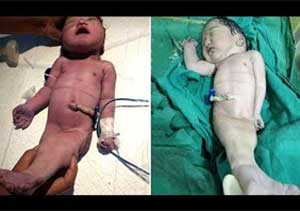- Home
- Editorial
- News
- Practice Guidelines
- Anesthesiology Guidelines
- Cancer Guidelines
- Cardiac Sciences Guidelines
- Critical Care Guidelines
- Dentistry Guidelines
- Dermatology Guidelines
- Diabetes and Endo Guidelines
- Diagnostics Guidelines
- ENT Guidelines
- Featured Practice Guidelines
- Gastroenterology Guidelines
- Geriatrics Guidelines
- Medicine Guidelines
- Nephrology Guidelines
- Neurosciences Guidelines
- Obs and Gynae Guidelines
- Ophthalmology Guidelines
- Orthopaedics Guidelines
- Paediatrics Guidelines
- Psychiatry Guidelines
- Pulmonology Guidelines
- Radiology Guidelines
- Surgery Guidelines
- Urology Guidelines
India's second Mermaid Baby Born in Kolkata but Dies Four Hours Later

A 23-year-old Indian Muskura Bibi has given birth to a ‘Mermaid baby’at the government-run Chittaranjan Deva Sadan Hospital in Kolkata.The baby had mermaid-like features but tragically it died just four hours later after birth. The sex of the baby was unclear due to its fused legs and underdeveloped pelvis.
As she couldn't afford any scans during her pregnancy, she learnt about the condition of the baby only after giving birth.Dr Sudip Saha, a child specialist at the hospital said: "The parents are a labouring couple and had not sought proper medication during pregnancy due to lack of money."
It is thought that lack of proper nutrition and improper blood circulation from a mother to the baby can create this kind of abnormality. The rare birth was the second such known case in India and the fifth in the world. Earlier in 2016, a woman from Uttar Pradesh gave birth to the first known 'mermaid baby' of the country, but it survived only for 10 minutes.The exact incidence of mermaid syndrome or Sirenomelia is unknown but according to an estimate it affects one in every 60,000 to 100,000 births and this was India's second.
Sirenomelia, which is also known as mermaid syndrome, is an extremely rare congenital developmental disorder characterized by anomalies of the lower spine and the lower limbs. Affected infants are born with the partial or complete fusion of the legs. Additional malformations may also occur including genitourinary abnormalities, gastrointestinal abnormalities, anomalies of the lumbarsacral spine and pelvis and absence or underdevelopment (agenesis) of one or both kidneys. Affected infants may have one foot, no feet or both feet, which may be rotated externally. The tailbone is usually absent and the sacrum is partially or completely absent as well. Additional conditions may occur with sirenomelia including imperforate anus, spina bifida, and heart (cardiac) malformations. Sirenomelia is often fatal during the newborn period. The exact cause of sirenomelia is unknown, most cases occur randomly for no apparent reason (sporadically).
Some sources in the medical literature classify sirenomelia as the most severe form of caudal regression syndrome, a complex developmental disorder.

Disclaimer: This site is primarily intended for healthcare professionals. Any content/information on this website does not replace the advice of medical and/or health professionals and should not be construed as medical/diagnostic advice/endorsement or prescription. Use of this site is subject to our terms of use, privacy policy, advertisement policy. © 2020 Minerva Medical Treatment Pvt Ltd